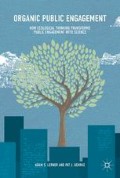Abstract
This chapter offers a perspective that combats both cynical and idealist forms of public engagement. Engaging in a conversation with the “demarcation problem,” this chapter suggests that a rhetorical standpoint helps reframe the difference between expert and nonexpert discourse and alleviates the cynical mindset. This conceptual development invites us to reconsider the authority of publics to deliberate on technical and scientific issues. Following our discussion of demarcation, ending with the collision between Kuhn and Popper, we examine how demarcation is enacted in legal settings. Our final task in this chapter is to briefly review and synthesize some of the arguments we have made in previous chapters and suggest that a rhetorical sensibility can assist in producing more ecologically valid public engagement with science.
Access this chapter
Tax calculation will be finalised at checkout
Purchases are for personal use only
Notes
- 1.
The most authoritative and superlative overview of this case can be located in Jasanoff’s Science at the Bar.
- 2.
More specifically the Daubert challenges, which is a hodgepodge of social constructivist, Popperian, and positivist benchmarks for determining expertise.
References
Collins, H.M., and Robert Evans. 2002. The Third Wave of Science Studies: Studies of Expertise and Experience. Social Studies of Science 32 (2): 235–296.
Durant, Darrin. 2011. Models of Democracy in Social Studies of Science. Social Studies of Science 41 (5): 691–714.
Edbauer, Jenny. 2005. Unframing Models of Public Distribution: From Rhetorical Situation to Rhetorical Ecologies. Rhetoric Society Quarterly 35 (4): 5–24.
Edmond, Gary. 1998. Down by Science: Context and Commitment in the Lay Response to Incriminating Scientific Evidence During a Murder Trial. Public Understanding of Science 7 (2): 83–111.
Edmond, Gary, and David Mercer. 1997. Scientific Literacy and the Jury: Reconsidering Jury ‘Competence’. Public Understanding of Science 6 (4): 329–357.
———. 2006. Anti-social Epistemologies. Social Studies of Science 36 (6): 843–853.
Emery, Steven B., Henk A.J. Mulder, and Lynn J. Frewer. 2015. Maximizing the Policy Impacts of Public Engagement: A European Study. Science, Technology, & Human Values 40 (3): 421–444.
Epstein, Steven. 1995. Democracy, Expertise, and AIDS Treatment Activism. In Science, Technology, & Democracy, ed. Daniel Lee Kleinman, 15–32. New York: State University of New York Press.
Fuller, Steven. 2006a. A Step Toward the Legalization of Science Studies. Social Studies of Science 36 (6): 827–834.
———. 2006b. The Philosophy of Science and Technology Studies. New York: Routledge.
Graham, S. Scott. 2015. The Politics of Pain Medicine: A Rhetorical-Ontological Inquiry. Chicago: University of Chicago Press.
Gross, Alan G. 2006. Starring the Text: The Place of Rhetoric in Science Studies. Carbondale: Southern Illinois University Press.
Hippocrates. On the Sacred Disease. The Internet Classics Archive. http://classics.mit.edu/Hippocrates/sacred.html.
Irwin, Alan. 1995. Citizen Science: A Study of People and Expertise and Sustainable Development. New York: Routledge.
Jasanoff, Sheila. 1995. Science at the Bar. Cambridge: Harvard University Press.
———. 2003. Breaking Waves in Science Studies: Common on H.M. Collins and Robert Evans, ‘The Third Wave of Science Studies’. Social Studies of Science 33 (3): 389–400.
Kuhn, Thomas. 2012. The Structure of Scientific Revolutions. 50th anniversary ed. Chicago: University of Chicago Press.
Laudan, Larry. 1983. The Demise of the Demarcation Problem. In Physics, Philosophy and Psychoanalysis, ed. R.S. Cohen and L. Laudan, 111–127. Dordrecht: Reidel.
Lloyd, G.E.R. 1979. Magic, Reason and Experience: Studies in the Origin and Development of Greek Science. Cambridge: Cambridge University Press.
———. 2009. Disciplines in the Making: Cross-Cultural Perspectives on Elites, Learning, and Innovation. Oxford: Oxford University Press.
Locke, Simon. 1999. Golem Science and the Public Understanding of Science: From Deficit to Dilemma. Public Understanding of Science 8 (2): 75–92.
Lynch, Michael. 2006. From Ruse to Farce. Social Studies of Science 36 (6): 819–826.
Lynch, Michael, and Simon Cole. 2005. Science and Technology Studies on Trial: Dilemmas of Expertise. Social Studies of Science 35 (2): 269–311.
Lynch, Paul, and Nathaniel Rivers, eds. 2015. Thinking with Bruno Latour in Rhetoric and Composition. Carbondale: Southern Illinois University Press.
Measles Cases and Outbreaks. Centers for Disease Control and Prevention. http://www.cdc.gov/measles/cases-outbreaks.html.
Mercer, David. 2016. Why Popper Can’t Resolve the Debate Over Global Warming: Problems with the Uses of Philosophy of Science in the Media and Public Framing of the Science of Global Warming. Public Understanding of Science: 1–14.
Popper, Karl. 1992. The Logic of Scientific Discovery. New York: Routledge.
Rickert, Thomas. 2013. Ambient Rhetoric: The Attunements of Rhetorical Being. Pittsburgh: University of Pittsburgh Press.
Wynne, Brian. 2003. Seasick on the Third Wave? Subverting the Hegemony of Propositionalism. Social Studies of Science 33 (3): 401–417.
Author information
Authors and Affiliations
Rights and permissions
Copyright information
© 2018 The Author(s)
About this chapter
Cite this chapter
Lerner, A.S., Gehrke, P.J. (2018). Scientific Expertise and Engagement Experts. In: Organic Public Engagement. Palgrave Macmillan, Cham. https://doi.org/10.1007/978-3-319-64397-7_5
Download citation
DOI: https://doi.org/10.1007/978-3-319-64397-7_5
Published:
Publisher Name: Palgrave Macmillan, Cham
Print ISBN: 978-3-319-64396-0
Online ISBN: 978-3-319-64397-7
eBook Packages: Social SciencesSocial Sciences (R0)

